3d Printing Safety - Fire detection relay
I've been doing some 3d printing lately, and I have some thoughts to share about security and safety.

This is my 3d printer, isn't it beautiful?
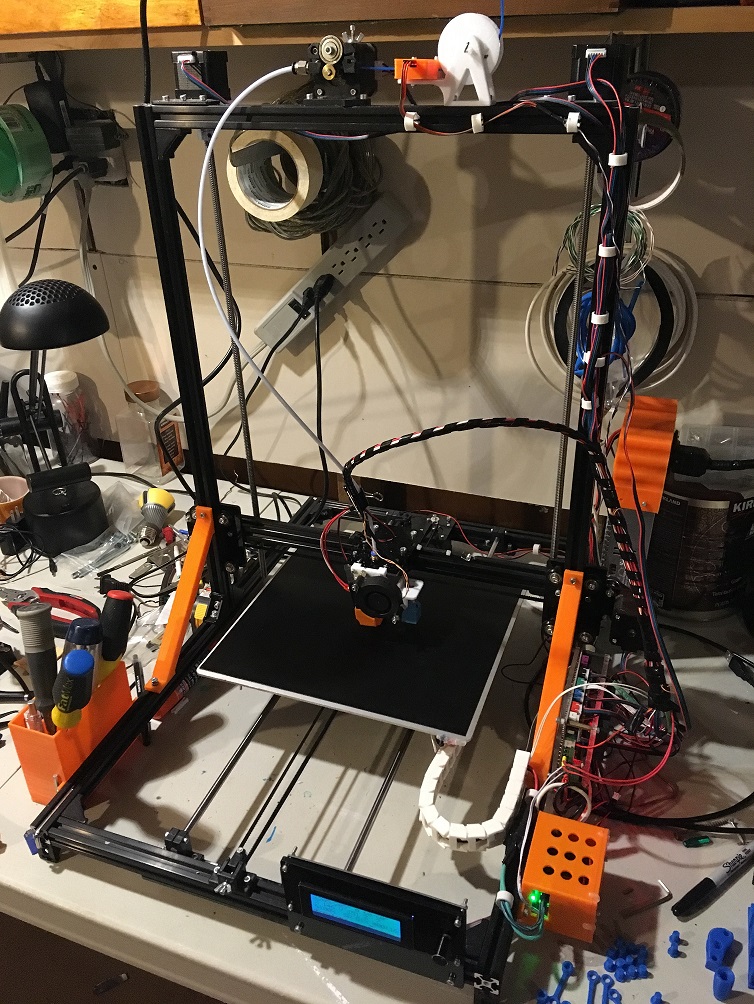
Here's something that isn't really highlighted when you buy a cheap chinese 3d printer. They aren't very safe.
This is the printer I bought:
A few prints in, this is what happened:
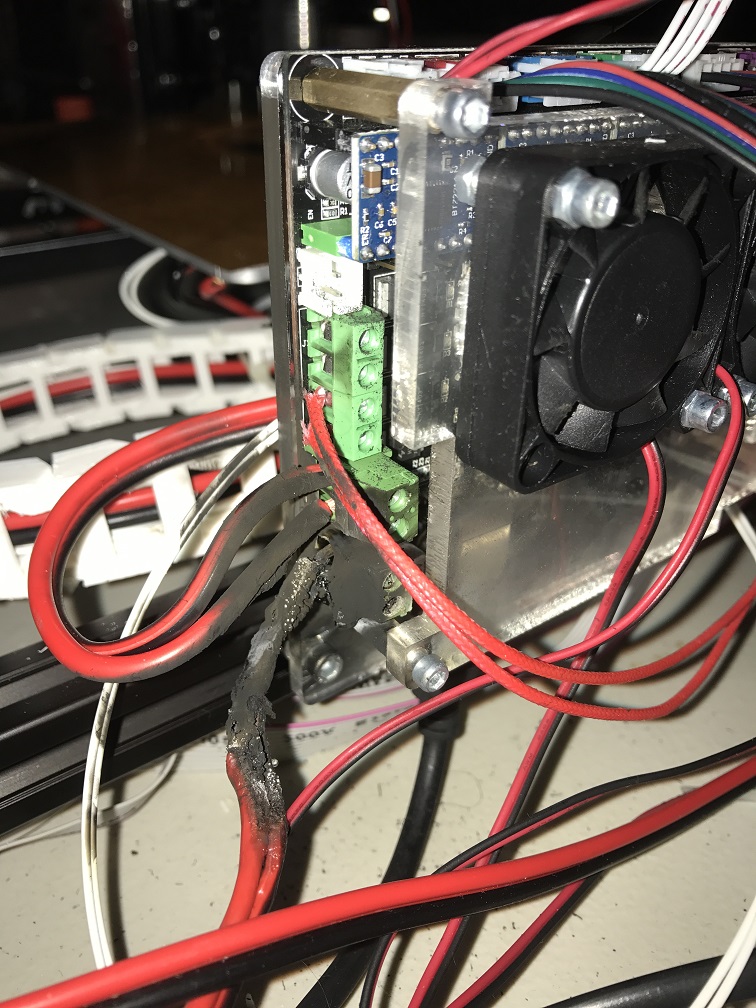
Ugh. I wasn't doing anything crazy here, but the amount of power routed through the motherboard for the heated bed and the extruder hot-end was too much, and the board caught fire.
Thankfully, I was in the other room and had a smoke detector right on top of the 3d printer. If I had left this unattended, it might have burned down my house.
Not. Cool.
So I fixed the fundamental design flaw by installing a mosfet to route the power for the heated bed, bypassing the motherboard:
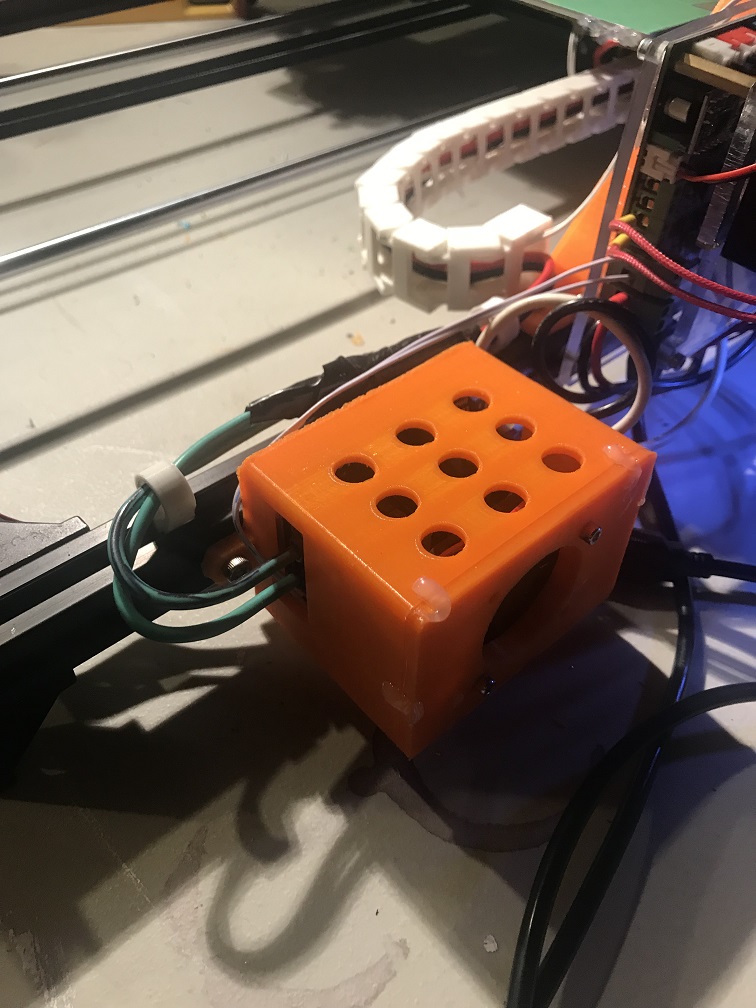
And while I was at it, added a proper power switch to the power terminal block:
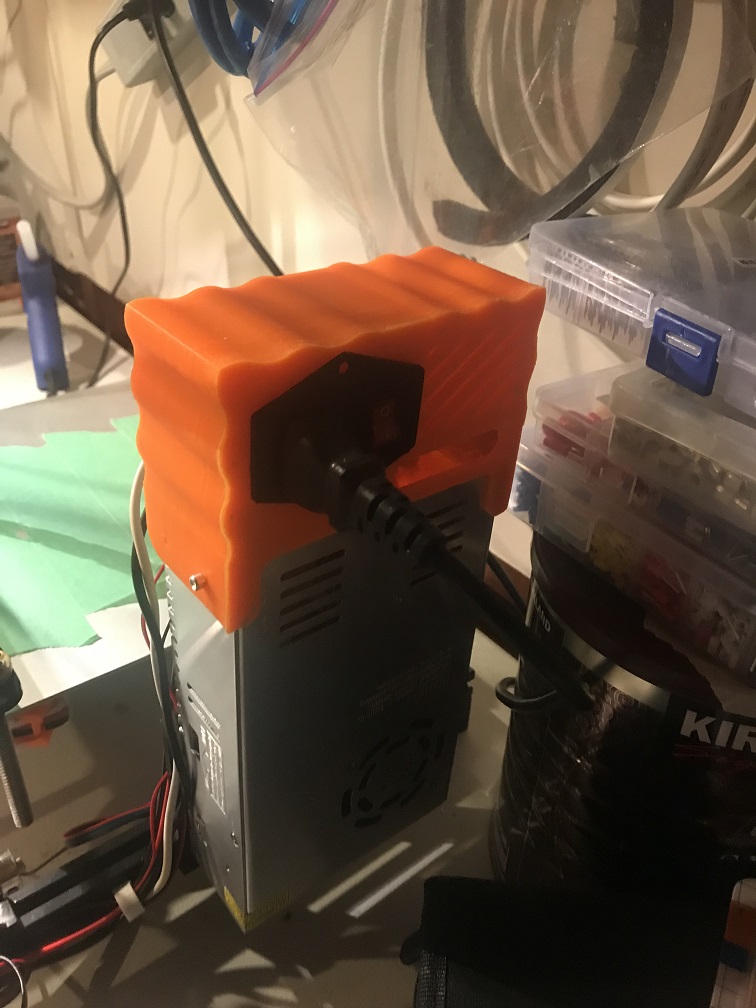
These two upgrades greatly increase the safety of running the printer. I also updated the firmware and enabled some thermal runaway protection. Nevertheless, this thing could still catch fire.
What I needed was a way to kill the power on the printer if things went wrong. I couldn't find any commercially available devices that would do this.
There had been a crowdfunded device, but the project was abandoned.
I came across this URL http://mkme.org/forum/viewtopic.php?t=706 which was pretty close to what I wanted to do, so off I went to buy some parts.
Here's my part list:
MQ2 smoke sensor 0.98$
Arduino Nano 1.79$
Passive Buzzer Module KY-006 3$ for 10
Breadboard
Black IEC C13 female Plug (2) 6$ for 10
110 volt AC to 12 volt DC switching power supply 11$ for 5
Fotek solid state relay 40 amp 3.40$
All-in, you're looking at about 25$ worth of parts to build this.
Whipping up the code to make it work:
#include "DHT.h"
#define DHTPIN 2 // what pin we're connected to
#define BUZZERPIN 3 // Alarm buzzer
#define SMOKEPIN 4 // Smoke/gas detector
#define DHTTYPE DHT11 // DHT 11
#define THERMAL_OVERLOAD 40 // Alarm temp High Limit
#define RELAYPIN 13
DHT dht(DHTPIN, DHTTYPE);
// inspired by https://github.com/MKme/3D-Printer-Safety-Shutoff
//https://www.youtube.com/watch?v=LBr6AROebYA
//http://mkme.org/forum/viewtopic.php?f=2&t=706&p=949&hilit=relay#p949
void setup() {
Serial.begin(9600);
Serial.println("Initializing... waiting for gas detector to warm up");
pinMode(BUZZERPIN,OUTPUT);
pinMode(SMOKEPIN, INPUT);
pinMode(RELAYPIN,OUTPUT);
// Right off the bat, turn off the relay...
digitalWrite (RELAYPIN, LOW);
delay(20000); // Need to wait 20 seconds before trying to read smoke sensor.
Serial.println("Done");
if (digitalRead(SMOKEPIN) == LOW) {
Serial.println("ON FIRE!");
alarm();
}
dht.begin();
}
void loop() {
// Wait a few seconds between measurements.
delay(1000);
// Reading temperature or humidity takes about 250 milliseconds!
// Sensor readings may also be up to 2 seconds 'old' (its a very slow sensor)
float h = dht.readHumidity();
// Read temperature as Celsius
float t = dht.readTemperature();
// Check if any reads failed and exit early (to try again).
if (isnan(h) || isnan(t)) {
Serial.println("Failed to read from DHT sensor!");
// Turn off power then return
alarm();
return;
}
Serial.print("Temperature: ");
Serial.print(t);
Serial.print(" *C ");
Serial.print(" Humidity: ");
Serial.println(h);
if (t >= THERMAL_OVERLOAD || digitalRead(SMOKEPIN) == LOW) {
alarm();
} else { // All good
digitalWrite(RELAYPIN, HIGH) ;
Serial.println(" System OKay");
}
}
void alarm() {
while(1) {
digitalWrite (RELAYPIN, LOW);
Serial.println("FIRE!");
sing(1);
sing(1);
sing(2);
}
}
#define NOTE_B0 31
#define NOTE_C1 33
#define NOTE_CS1 35
#define NOTE_D1 37
#define NOTE_DS1 39
#define NOTE_E1 41
#define NOTE_F1 44
#define NOTE_FS1 46
#define NOTE_G1 49
#define NOTE_GS1 52
#define NOTE_A1 55
#define NOTE_AS1 58
#define NOTE_B1 62
#define NOTE_C2 65
#define NOTE_CS2 69
#define NOTE_D2 73
#define NOTE_DS2 78
#define NOTE_E2 82
#define NOTE_F2 87
#define NOTE_FS2 93
#define NOTE_G2 98
#define NOTE_GS2 104
#define NOTE_A2 110
#define NOTE_AS2 117
#define NOTE_B2 123
#define NOTE_C3 131
#define NOTE_CS3 139
#define NOTE_D3 147
#define NOTE_DS3 156
#define NOTE_E3 165
#define NOTE_F3 175
#define NOTE_FS3 185
#define NOTE_G3 196
#define NOTE_GS3 208
#define NOTE_A3 220
#define NOTE_AS3 233
#define NOTE_B3 247
#define NOTE_C4 262
#define NOTE_CS4 277
#define NOTE_D4 294
#define NOTE_DS4 311
#define NOTE_E4 330
#define NOTE_F4 349
#define NOTE_FS4 370
#define NOTE_G4 392
#define NOTE_GS4 415
#define NOTE_A4 440
#define NOTE_AS4 466
#define NOTE_B4 494
#define NOTE_C5 523
#define NOTE_CS5 554
#define NOTE_D5 587
#define NOTE_DS5 622
#define NOTE_E5 659
#define NOTE_F5 698
#define NOTE_FS5 740
#define NOTE_G5 784
#define NOTE_GS5 831
#define NOTE_A5 880
#define NOTE_AS5 932
#define NOTE_B5 988
#define NOTE_C6 1047
#define NOTE_CS6 1109
#define NOTE_D6 1175
#define NOTE_DS6 1245
#define NOTE_E6 1319
#define NOTE_F6 1397
#define NOTE_FS6 1480
#define NOTE_G6 1568
#define NOTE_GS6 1661
#define NOTE_A6 1760
#define NOTE_AS6 1865
#define NOTE_B6 1976
#define NOTE_C7 2093
#define NOTE_CS7 2217
#define NOTE_D7 2349
#define NOTE_DS7 2489
#define NOTE_E7 2637
#define NOTE_F7 2794
#define NOTE_FS7 2960
#define NOTE_G7 3136
#define NOTE_GS7 3322
#define NOTE_A7 3520
#define NOTE_AS7 3729
#define NOTE_B7 3951
#define NOTE_C8 4186
#define NOTE_CS8 4435
#define NOTE_D8 4699
#define NOTE_DS8 4978
#define melodyPin 3
//Mario main theme melody
int melody[] = {
NOTE_E7, NOTE_E7, 0, NOTE_E7,
0, NOTE_C7, NOTE_E7, 0,
NOTE_G7, 0, 0, 0,
NOTE_G6, 0, 0, 0,
NOTE_C7, 0, 0, NOTE_G6,
0, 0, NOTE_E6, 0,
0, NOTE_A6, 0, NOTE_B6,
0, NOTE_AS6, NOTE_A6, 0,
NOTE_G6, NOTE_E7, NOTE_G7,
NOTE_A7, 0, NOTE_F7, NOTE_G7,
0, NOTE_E7, 0, NOTE_C7,
NOTE_D7, NOTE_B6, 0, 0,
NOTE_C7, 0, 0, NOTE_G6,
0, 0, NOTE_E6, 0,
0, NOTE_A6, 0, NOTE_B6,
0, NOTE_AS6, NOTE_A6, 0,
NOTE_G6, NOTE_E7, NOTE_G7,
NOTE_A7, 0, NOTE_F7, NOTE_G7,
0, NOTE_E7, 0, NOTE_C7,
NOTE_D7, NOTE_B6, 0, 0
};
//Mario main them tempo
int tempo[] = {
12, 12, 12, 12,
12, 12, 12, 12,
12, 12, 12, 12,
12, 12, 12, 12,
12, 12, 12, 12,
12, 12, 12, 12,
12, 12, 12, 12,
12, 12, 12, 12,
9, 9, 9,
12, 12, 12, 12,
12, 12, 12, 12,
12, 12, 12, 12,
12, 12, 12, 12,
12, 12, 12, 12,
12, 12, 12, 12,
12, 12, 12, 12,
9, 9, 9,
12, 12, 12, 12,
12, 12, 12, 12,
12, 12, 12, 12,
};
//Underworld melody
int underworld_melody[] = {
NOTE_C4, NOTE_C5, NOTE_A3, NOTE_A4,
NOTE_AS3, NOTE_AS4, 0,
0,
NOTE_C4, NOTE_C5, NOTE_A3, NOTE_A4,
NOTE_AS3, NOTE_AS4, 0,
0,
NOTE_F3, NOTE_F4, NOTE_D3, NOTE_D4,
NOTE_DS3, NOTE_DS4, 0,
0,
NOTE_F3, NOTE_F4, NOTE_D3, NOTE_D4,
NOTE_DS3, NOTE_DS4, 0,
0, NOTE_DS4, NOTE_CS4, NOTE_D4,
NOTE_CS4, NOTE_DS4,
NOTE_DS4, NOTE_GS3,
NOTE_G3, NOTE_CS4,
NOTE_C4, NOTE_FS4, NOTE_F4, NOTE_E3, NOTE_AS4, NOTE_A4,
NOTE_GS4, NOTE_DS4, NOTE_B3,
NOTE_AS3, NOTE_A3, NOTE_GS3,
0, 0, 0
};
//Underwolrd tempo
int underworld_tempo[] = {
12, 12, 12, 12,
12, 12, 6,
3,
12, 12, 12, 12,
12, 12, 6,
3,
12, 12, 12, 12,
12, 12, 6,
3,
12, 12, 12, 12,
12, 12, 6,
6, 18, 18, 18,
6, 6,
6, 6,
6, 6,
18, 18, 18, 18, 18, 18,
10, 10, 10,
10, 10, 10,
3, 3, 3
};
int song = 0;
void sing(int s) {
// iterate over the notes of the melody:
song = s;
if (song == 2) {
Serial.println(" 'Underworld Theme'");
int size = sizeof(underworld_melody) / sizeof(int);
for (int thisNote = 0; thisNote < size; thisNote++) {
// to calculate the note duration, take one second
// divided by the note type.
//e.g. quarter note = 1000 / 4, eighth note = 1000/8, etc.
int noteDuration = 1000 / underworld_tempo[thisNote];
buzz(BUZZERPIN, underworld_melody[thisNote], noteDuration);
// to distinguish the notes, set a minimum time between them.
// the note's duration + 30% seems to work well:
int pauseBetweenNotes = noteDuration * 1.30;
delay(pauseBetweenNotes);
// stop the tone playing:
buzz(BUZZERPIN, 0, noteDuration);
}
} else {
Serial.println(" 'Mario Theme'");
int size = sizeof(melody) / sizeof(int);
for (int thisNote = 0; thisNote < size; thisNote++) {
// to calculate the note duration, take one second
// divided by the note type.
//e.g. quarter note = 1000 / 4, eighth note = 1000/8, etc.
int noteDuration = 1000 / tempo[thisNote];
buzz(BUZZERPIN, melody[thisNote], noteDuration);
// to distinguish the notes, set a minimum time between them.
// the note's duration + 30% seems to work well:
int pauseBetweenNotes = noteDuration * 1.30;
delay(pauseBetweenNotes);
// stop the tone playing:
buzz(BUZZERPIN, 0, noteDuration);
}
}
}
void buzz(int targetPin, long frequency, long length) {
long delayValue = 1000000 / frequency / 2; // calculate the delay value between transitions
//// 1 second's worth of microseconds, divided by the frequency, then split in half since
//// there are two phases to each cycle
long numCycles = frequency * length / 1000; // calculate the number of cycles for proper timing
//// multiply frequency, which is really cycles per second, by the number of seconds to
//// get the total number of cycles to produce
for (long i = 0; i < numCycles; i++) { // for the calculated length of time...
digitalWrite(targetPin, HIGH); // write the buzzer pin high to push out the diaphram
delayMicroseconds(delayValue); // wait for the calculated delay value
digitalWrite(targetPin, LOW); // write the buzzer pin low to pull back the diaphram
delayMicroseconds(delayValue); // wait again or the calculated delay value
}
}
I've also designed a case to hold the parts:
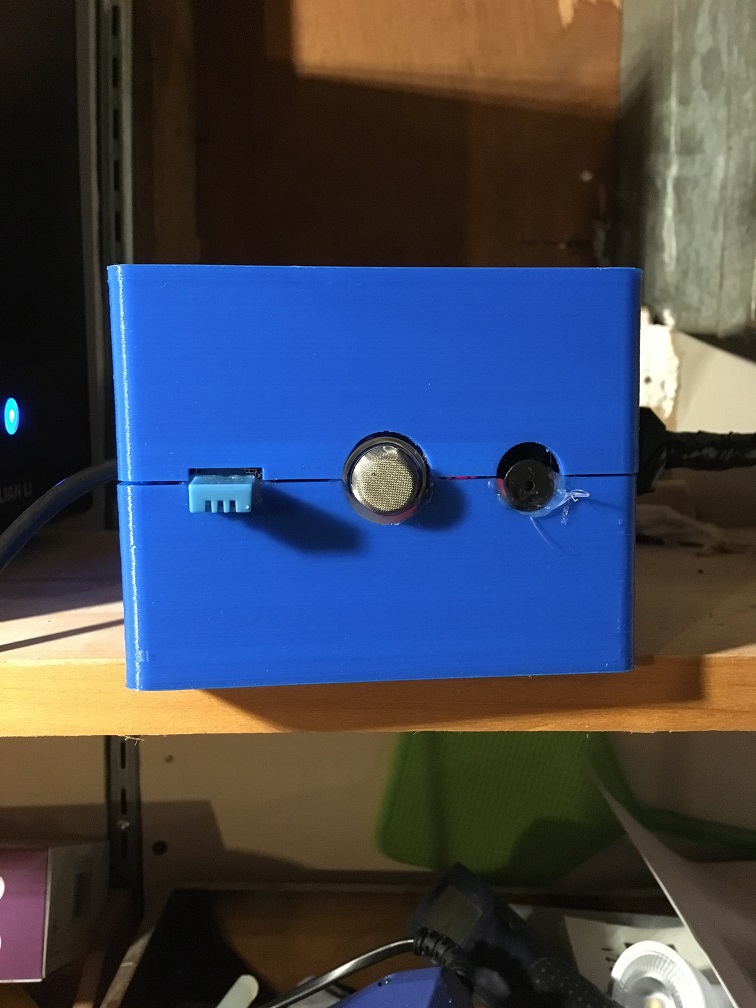
Here's the layout of the parts inside:
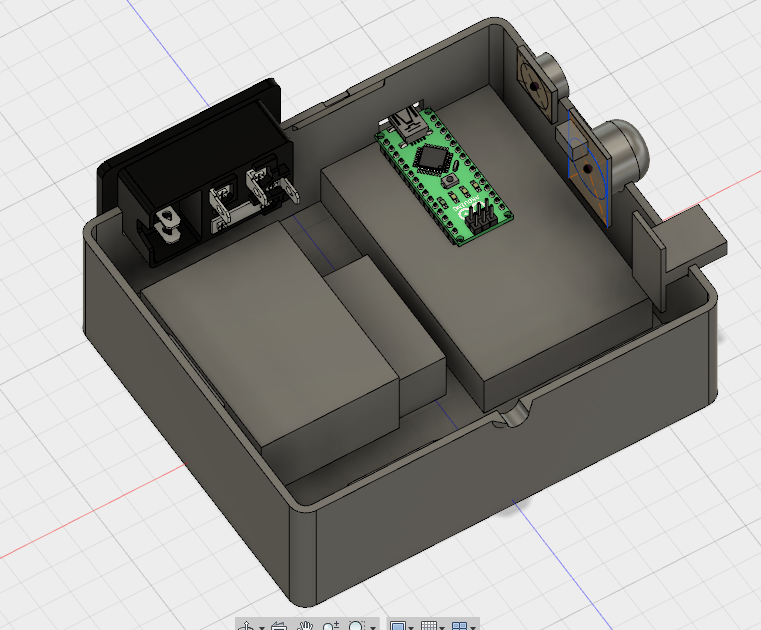
So essentially how it works is that it will cut the power to the relay if the smoke sensor senses anything, or the temperature reaches 40 degrees C. I've plugged the 3d printer into it, and have been testing it out. So far it works great.
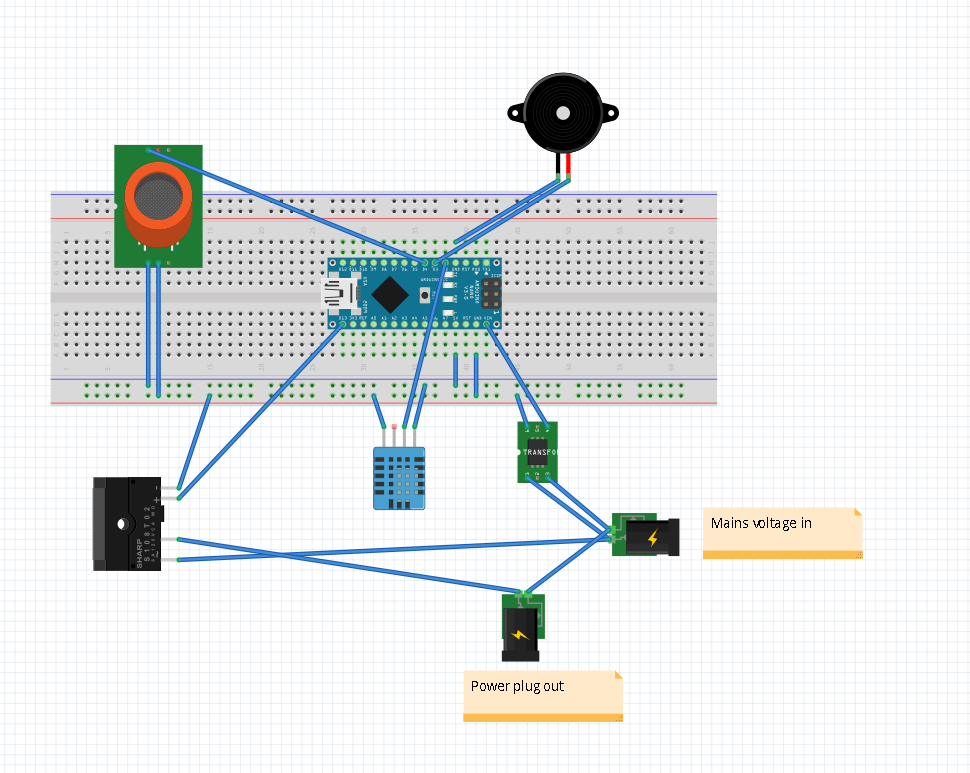
Some details on the wiring.
Mains voltage comes in and the live wire is splice to the 120V to 12V transformer and the SSR pin 1. Neutral is spliced to the rocker switch as well as the transformer neutral. Ground mains connects to rocker mains.
The 120V-12V transformer connects to the nano on VIN and ground.
Digital pin 13 on the nano goes to SSR pin 3 (+).
SSR pin 4 (-) goes to nano ground.
Nano d3 goes to Piezo signal pin. Nano ground goes to piezo -
Nano 5V goes to DHT11 +
Nano D2 goes to DHT11 out
Nano ground goes to DHT11 -
Nano 5V goes to MQ1 VCC
Nano d4 goes to MQ2 D0
Nano ground goes to MQ2 gnd.
